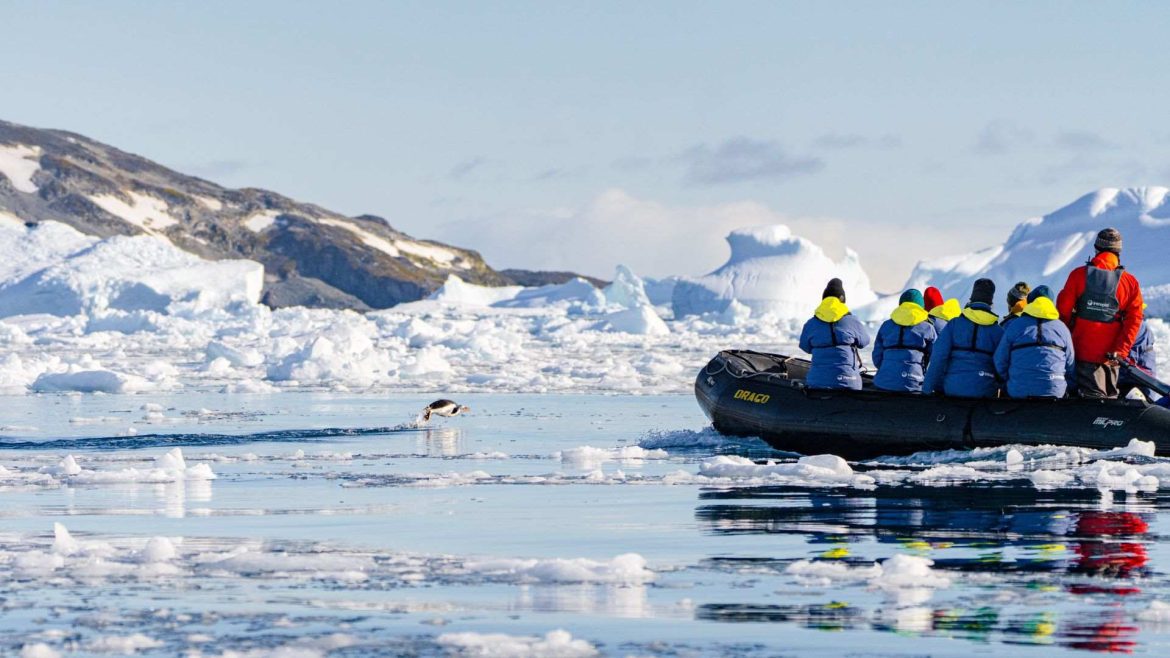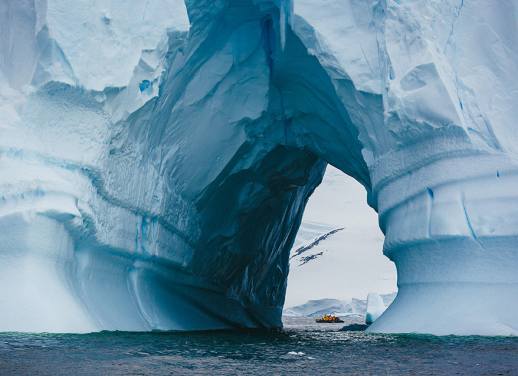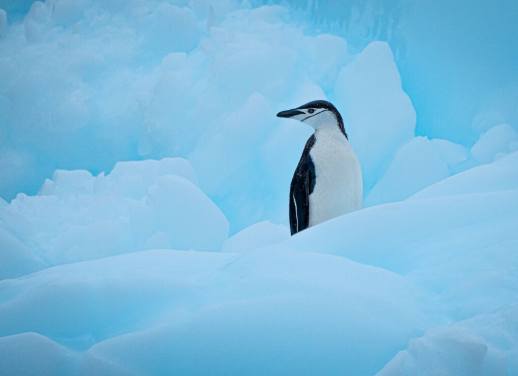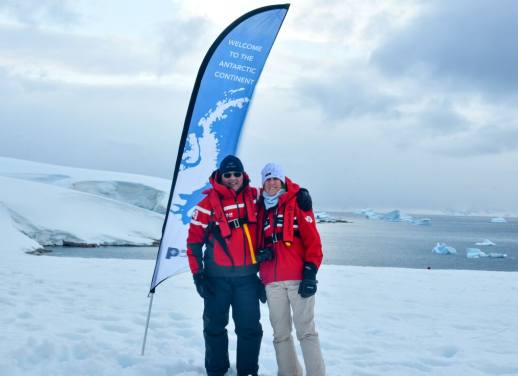Forget penguins. For this traveller-turned-citizen-scientist, Antarctica’s phytoplankton are where it’s at.
When Brittanie Graswich stepped onboard Intrepid’s Ocean Endeavour to Antarctica, she had no idea what citizen science was, let alone that it was a program she could participate in. ‘I’d never been on a cruise. I figured we would hang out, and some activities would be planned. I knew I’d see penguins but had no clue such a surprise was in store,’ she says.
‘I haven’t looked through a microscope since I was a kid, but one of the best parts of my trip was spending time on the water collecting phytoplankton specimens and then coming back onboard to look at them under a microscope.’
Conducting scientific research in remote destinations like Antarctica is no easy feat. That’s where people like Brittanie can help. Intrepid’s citizen science program enables travellers who visit the region to support scientists on the ground with research that has a global impact.
‘One day, we found a species that looked like a little octopus. I can’t remember if we figured out which species it was, but it was such an unexpected discovery!’
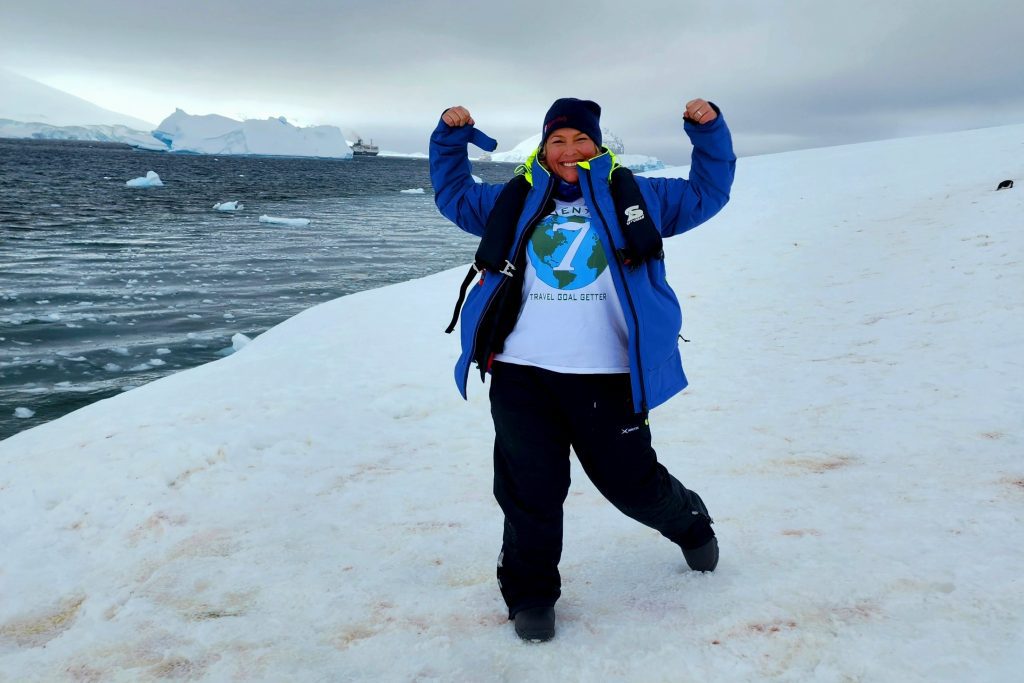
Brittanie’s eyes light up as she recalls how boarding a Zodiac and heading onto the water made her feel like she was embarking on an expedition. Her interest in Antarctic travel can be traced back to third grade when she did a book report on Ernest Shackleton, an Irish explorer famous for his polar voyages.
As a Shackleton fan, Brittanie was fascinated when Emily Gregory, an Intrepid citizen science coordinator, briefed them on the phytoplankton program. Emily explained they were collecting data on phytoplankton in collaboration with FjordPhyto – a polar citizen science project funded by NASA.
Phytoplankton is the first step in the ocean’s food chain and is responsible for half of the earth’s photosynthesis. Understanding how this tiny organism varies seasonally underpins crucial ongoing studies by FjordPhyto into how melting glaciers impact the ocean’s ecosystems.
It’s just one of the citizen science initiatives offered on board the Ocean Endeavour. ‘The idea is to enhance tourist understanding of the polar regions that we’re so privileged to visit,’ Emily says. She adds that it also gives individuals coming to the area an opportunity ‘to connect the dots between what’s happening at our poles and in their own backyard.’
But it’s not just a fun activity for passengers. Studying Antarctica’s fragile ecosystem is a costly venture, so organisations like FjordPhyto partner with companies like Intrepid to engage travellers to help gather data. Intrepid gets to support scientific research that is crucial to protecting the environment. Travellers like Brittanie can team up with real scientists to immerse themselves in one of the most remarkable places on the planet.
‘I really felt like I was part of something bigger,’ Brittanie explains. ‘When you’re heading out on the water and hear the ice cracking, you feel so alive.’
All I could think about was how Shackleton had seen this, and now I have too. It still gives me goosebumps.
Following in Shackleton’s path across the Drake Passage was one thing. For Brittanie to then experience citizen science was the cherry on top of the iceberg. ‘Move over, Shackleton, I’m following in the footsteps of Douglas Mawson now,’ she says jokingly.
While Brittanie won’t get to team up with the late Mawson – an internationally acclaimed Australian explorer and scientist – she did get to collaborate with real scientists in Antarctica. Along with phytoplankton specimen collecting, she had an opportunity to participate in several citizen science initiatives during her trip: Studying cloud cover for NASA, monitoring seabird patterns over the Southern Ocean and snapping images of whale flukes to help researchers track the movement of individual whales.
Brittanie repeatedly signed up for the initiatives, explaining that while they may be scientific, they are also a lot of fun. ‘All of us worked together to collect the phytoplankton specimens, and then we brought them back to the boat. A microscope was set up on the ship’s presentation lounge with a big video screen. Emily then started explaining all the different things we had found in the water.’


At this point, anyone on the ship can join in on the learnings. Brittanie shares that on many evenings, large groups of fellow travellers would sit side by side with their little books, trying to identify all the phytoplankton species. ‘It’s almost like a Pokemon type of situation, where you want to find them all.’
This is why Emily left Australia’s Sunshine Coast for Antarctica in what she describes as the ‘most drastic move ever.’ She loves being with people like Brittanie who want to experience these places and get involved in protecting them.
‘The part I love most about my job is watching the awe in people’s eyes when they see parts of the world like Antarctica and being involved in increasing that passion and increasing that education,’ she says. ‘The connection and camaraderie you have with like-minded people when you’re on a trip like this is like nothing else.’
Brittanie agrees that travelling with like-minded people makes everything more magical. She and her fellow travellers went home with a deeper understanding and drive for conservation. They would talk about it almost daily on the ship, thinking about how to impact this into the world.
‘The way we are so worried about taking care of Antarctica – I wish we could view our backyards that way. Because they are just as precious and have their own little ecosystems that must be protected.’
Since coming back, Brittanie has looked into finding citizen scientist programs she can participate in a little closer to home and actioning valuable lessons. ‘I always want to collect rocks as keepsakes. I learned that could cause baby penguins to be without a nest to live in, and that could mean no more baby penguins. I’ll never move a rock anywhere in the world again.’
Find more information on Intrepid’s citizen science program here and learn more about Intrepid’s small group adventures to Antarctica.

